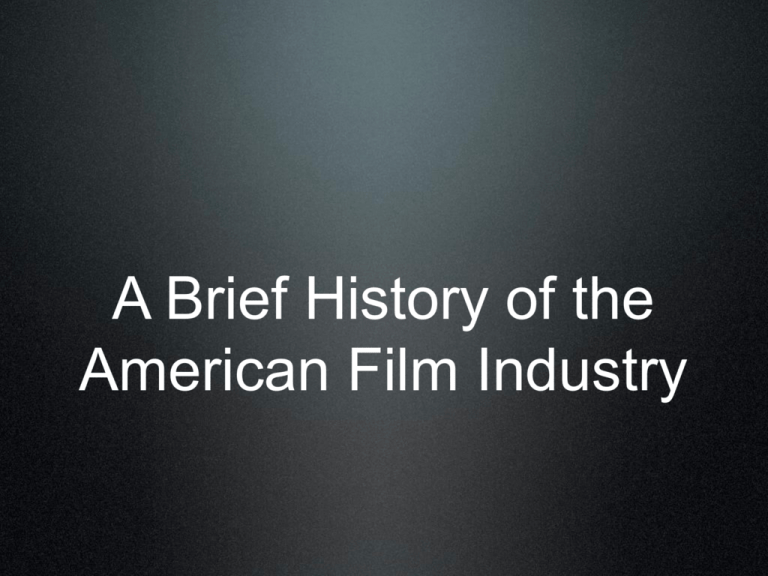The Birth of a Nation
advertisement

A Brief History of the American Film Industry Background • Photography makes film possible • Modern camera developed late 1800’s • First movies were collections of stills Edward Muybridge • 1877, first “movie” • Helped someone win a bet about horses galloping • Used multiple cameras and tripwires QuickTime™ and a H.264 decompressor are needed to see this picture. Thomas Edison • Invented the Kinetescope • Contained in a giant box, played a 90-second film at Columbian Exposition, 1893 • Generally credited with inventing the movie camera QuickTime™ and a H.264 decompressor are needed to see this picture. Lumiere Brothers • 1895, screened the first public “movie” using their portable “cinematograph” • 10 short films lasting 20 minutes • Caused a sensation QuickTime™ and a H.264 decompressor are needed to see this picture. Film for the Public • Edison’s The Great Train Robbery, 1903 (11 minute Western- huge hit) • Nickelodeons spread by the thousands (small viewing booths screening raunchy material) The Birth of Modern Film • D.W. Griffith, director of The Birth of a Nation, 1915 (first feature-length film) • Plot: In the post-Civil War South, northerners and black soldiers move in to persecute whites, who are saved by the newly formed Ku klux Klan • The “birth” of the nation was the uniting of Northern and Southern whites against the common enemy- black people. • Technical masterpiece, horribly distorted history The Birth of a Nation’s Contribution to Film • Developed or perfected the following: moving the camera!, close-ups, close-ups with slow pan, jump cuts, close-ups turning into long shots, flashbacks, intercutting, dolly shot, tinted / colored film for effect, use of soundtrack to tell story • Plot pieces which have become cliche: barroom brawl, surrounded heroes attacked by savages, cavalry saving the day, masculine hero and blonde heroine, monster chase scene History of Hollywood • 1915, Development of the “star system” (the creation and promotion of movie stars) • First major motion picture company: United Artists (others: Fox, Columbia, Paramount, MGM, universal, etc.) • These companies create, finance, produce, direct, compose scores, provide actors, market, and distribute films The Silent Era: 1920’s • Film companies flock to California after WWI: cheap land, interesting scenery, good weather and light • Hollywood is established (sign: 1923) • Development of large theaters that seat 12 thousand people • 1927: The Jazz Singer (first “talkie”) • 1928: First Walt Disney cartoon The Golden Age: 1930’s • Great Depression begins, 1929 • Movie industry booms, producing some of the great musicals, horror films, gangster flicks, and screwball comedies • European film industry people begin to flock to Hollywood • 1939: 769 movies released, 80,000,000 tickets sold per week, 65% of Americans went to movies regularly • 1994: 470 movies released, 25,000,000 tickets sold per week, 10% of Americans went to movies regularly The 1940’s • Film as propaganda • Patriotic WWI films like Sergeant York (1941) • Documentaries like Frank Capra’s Why We Fight (1941) • Casablanca (1942) • Wartime romances, homespun hero stories, etc. The 1950’s and 1960’s • Advent of television cripples movie industry at first (Pre WWII: 500+ movies per year: 1950’s, 250 per year) • Movie industry fought TV industry and lost • McCarthyism threatened creativity • Hollywood Ten and the House Un-American Activities Committee • The age of the western in the 1950’s • Hollywood languishes in the 1960s • First successful “indie” films in the 1960’s Hollywood’s Renaissance: the 1970’s • An explosion of excellent films and brilliant actors • Independent, radical filmmakers influenced by European film styles • Birth of the “mega-blockbuster” • Patton, The French Connection, The Godfather I and II, The Exorcist, Chinatown, One Flew Over the Cuckoo’s Nest, Rocky, Jaws, Star Wars, Apocalypse Now, etc. The 1980’s-Present • Cineplexes • International Distribution • Spin-Off Merchandising • Big Budget Films as well as Indies • Movie Rentals • Cable • HBO • Digital Cameras, Digital Editing • Development of Computer Graphics*








